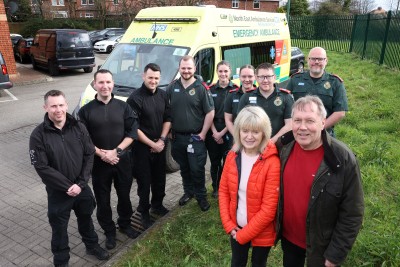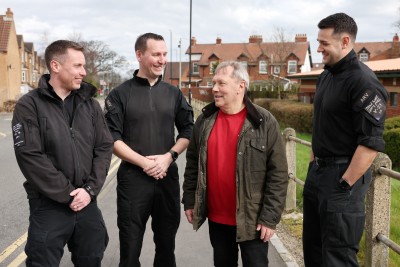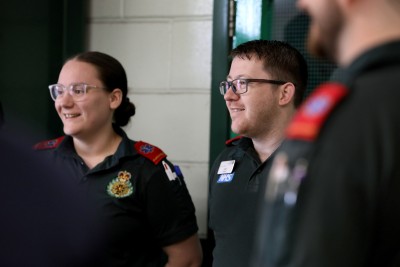On 11 January 2025, Philip Wright, 71, had just attended a Sunderland vs Stoke City
Immediately jumping to action, a bystander who worked at the bar at the time and on-scene police officers from Northumbria Police began compressions as a 999 call was made.
Early intervention for 'out-of-hospital' cardiac arrests is vital with a less than 1 in 10 chance of survival without it. For each minute that a cardiac arrest patient does not receive CPR or defibrillation, their chance of long-term survival decreases by 10%.
Tuesday 25 March 2025 marks the first time Philip has been able to meet and thank the crews and police officer who saved his life. He said: “I don’t remember anything from my cardiac arrest, only that I know I was with my friend when it happened. I hadn’t even experienced any symptoms beforehand, so it really came as a shock to those around me.”
Those at the reunion were newly qualified paramedics Josh Plumpton, Charlotte Spark, Georgia Liddle and Stephen Duffield. Along with clinical team leader Elliott Tyler from NEAS, Police Constable Mark Aitchison, Police Constable Graeme Burton and Police Constable Andy Hall from Northumbria Police.
Police Constable Mark Atchison, of Northumbria Police, said: “This wasn’t the typical match-day incident we’re used to dealing with.
“But I’m so glad we were in the right place at the right time, and were able to provide Phil with the immediate care that helped to save his life, until our colleagues from the North East Ambulance Service arrived to take him to hospital.”

A North East Ambulance Service health advisor answered the call and began the incredibly time-sensitive job of triaging Philip to ensure he received the right care as soon as possible. A dispatcher then worked to get a crew to Phil as the clock continued to tick.
In 2023/24, the North East Ambulance Service reported that over 57% of their patients who received bystander CPR received a return of spontaneous circulation (ROSC). Of these patients 39% survived to 30 days, as opposed to the much smaller 9% who had achieved ROSC without CPR intervention.
First on-scene were Pallion-based NEAS crew, Josh Plumpton and Charlotte Spark.
Despite navigating swathes of football fans who were in the city centre that evening, Josh said: “I remember the call very well. We didn’t have much information other than we were attending a cardiac arrest and that the scene was chaotic. When we arrived, very good CPR was already being carried out by a bystander and our colleagues at the police took over compressions allowing us to focus on giving Phil advanced life support.”
A cardiac arrest happens when the heart suddenly stops pumping, which prevents blood from flowing to the brain and other vital organs, depriving them of oxygen. This is different from a heart attack, although a heart attack can lead to a cardiac arrest.
Josh continues, “Everything that could have gone in Philip’s favour literally did. His cardiac arrest was recognised early, he received effective early CPR, and then early shocks were delivered by the defibrillator. All of this had a huge impact on the positive outcome of his care and was a great example of fantastic patient care from everyone involved.”

Philip Wright continues, “I spent three weeks in hospital; one at Sunderland Royal and two at James Cook before I was allowed to come home and continue my recovery. Although nobody wants to experience what I did, myself included, I am incredibly pleased and grateful for the care I received. Because of them and how quickly they were able to respond, I am still here and feeling much better. Even though the future is uncertain, I wanted to meet the people who saved me and thank them in person.”
Stephen Duffield, and crewmate Georgia Liddle from Pallion ambulance station also responded to the call, serving as much needed backup to Josh and Charlotte who had arrived on-scene. After working alongside their colleagues, including Elliott Tyler, a clinical team leader and a specialist paramedic, to stabilise a very poorly Phil, they transported him to Sunderland Royal Hospital where he was handed over to their A&E team.
On having the chance to meet Philip again and see his progress, Stephen said: “This is my first reunion with a patient. In honesty it feels a bit surreal as we don’t often get positive results from cardiac arrests, as only 1 in 10 survive, but it makes all the training and effort worth it to see that on this occasion we have saved this gentleman’s life.”

Police officer, Mark Atchison added: “I’m over the moon we’ve had the chance to meet up with Phil again and see how well he’s doing now. Seeing him fit and well really hits home why we carry out the CPR training we do.
“It’s not very often we get to see a successful outcome in incidents like, in fact this is my first one in 7 years.
“We work closely with the North East Ambulance Service when there’s a traumatic incident like this and it shows how important the teamwork between emergency services are.
“To get the thanks of members of the public like Phil and his family just shows how much those in our communities appreciate the role we play.”
It only takes a few minutes to learn CPR. To find out more, visit https://
To learn the difference between a cardiac arrest and a heart attack, visit: https://www.bhf.org.uk/informationsupport/heart-matters-magazine/medical/heart-attack-and-cardiac-arrest

